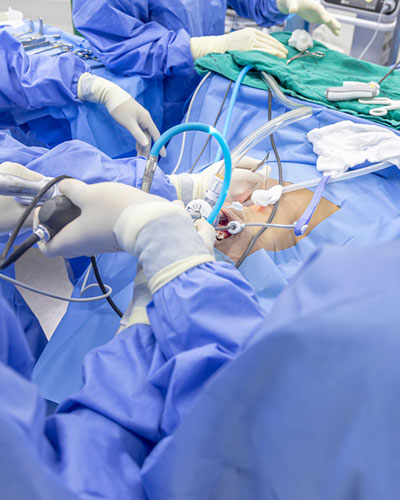General Surgery
What are the treatments done by general surgeon:
- Appendectomy: Removal of the appendix to treat appendicitis and prevent complications.
- Cholecystectomy: Surgical removal of the gallbladder, typically due to gallstones causing pain or infection.
- Hernia Repair: Surgical correction of hernias, including inguinal, femoral, and umbilical hernias.
- Colon Resection: Removal of a part of the colon, often due to cancer, diverticulitis, or severe bowel obstruction.
- Mastectomy: Surgical removal of breast tissue, usually as a treatment for breast cancer.
- Thyroidectomy: Removal of all or part of the thyroid gland, often necessary in cases of thyroid cancer or hyperthyroidism.
- Bowel Obstruction Surgery: Interventions to relieve obstructions in the intestines, which can involve resection or bypass.
- Laparoscopic Surgery: Minimally invasive procedures for various conditions, including gallbladder surgery and hernia repairs, utilizing small incisions and cameras.

- Skin Lesion Excision: Removal of abnormal skin growths, including cysts, moles, and tumors.
- Trauma Surgery: Emergency surgical procedures to address injuries from accidents, including repairs of organs and blood vessels.
Tips to recover quickly from a surgery:
Recovering quickly from general surgery involves several key strategies to support your healing process. First, following your surgeon’s post-operative instructions is crucial, including caring for the incision site, recognizing signs of infection, and adhering to medication schedules. Second, prioritize rest and allow your body ample time to heal; avoid strenuous activities or heavy lifting for the recommended period. Hydration and a balanced diet rich in protein, vitamins, and minerals can boost your immune system and facilitate tissue repair. Incorporating light, gentle movement, such as short walks, can improve circulation and prevent complications like blood clots, but ensure to listen to your body and not overdo it. Pain management is also vital; keeping pain levels under control will help you engage in necessary activities without undue stress. Consider joining a support group or enlisting friends and family to assist with daily tasks, providing emotional and physical support. Additionally, mental wellness plays a significant role; practice relaxation techniques like deep breathing or meditation to ease anxiety and promote a positive outlook. Lastly, regular follow-up appointments with your healthcare provider will ensure your recovery is on track and address any concerns promptly. By adhering to these tips, you can facilitate a smoother and quicker recovery post-surgery.

